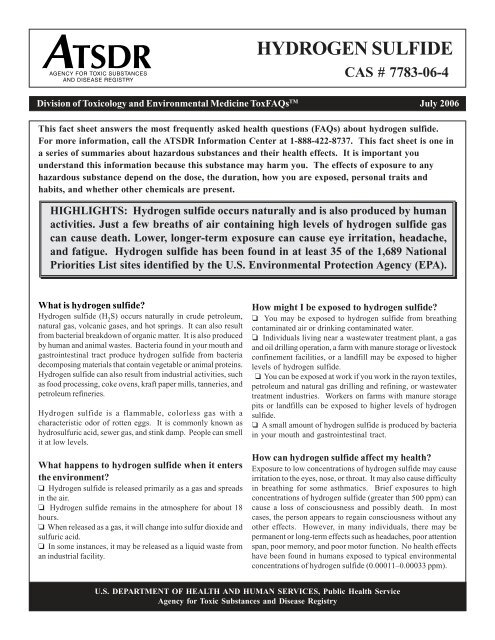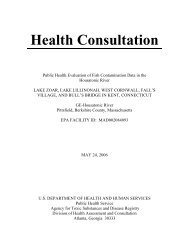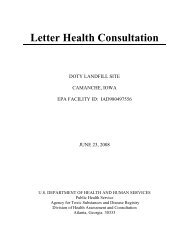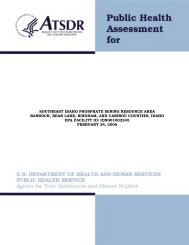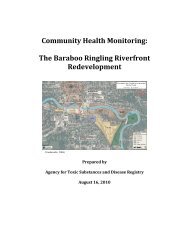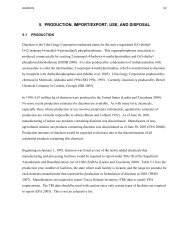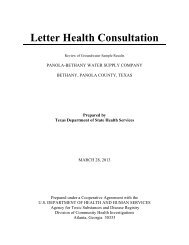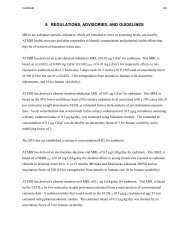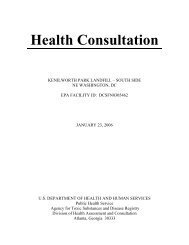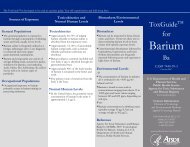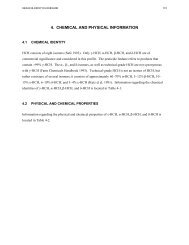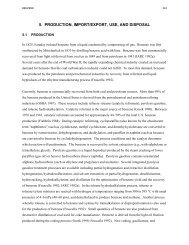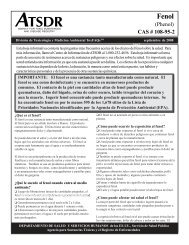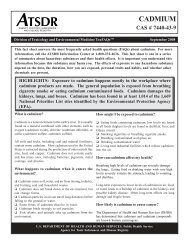Hydrogen Sulfide ToxFAQ - ATSDR
Hydrogen Sulfide ToxFAQ - ATSDR
Hydrogen Sulfide ToxFAQ - ATSDR
You also want an ePaper? Increase the reach of your titles
YUMPU automatically turns print PDFs into web optimized ePapers that Google loves.
HYDROGEN SULFIDE<br />
CAS # 7783-06-4<br />
Division of Toxicology and Environmental Medicine <strong>ToxFAQ</strong>s TM July 2006<br />
This fact sheet answers the most frequently asked health questions (FAQs) about hydrogen sulfide.<br />
For more information, call the <strong>ATSDR</strong> Information Center at 1-888-422-8737. This fact sheet is one in<br />
a series of summaries about hazardous substances and their health effects. It is important you<br />
understand this information because this substance may harm you. The effects of exposure to any<br />
hazardous substance depend on the dose, the duration, how you are exposed, personal traits and<br />
habits, and whether other chemicals are present.<br />
HIGHLIGHTS: <strong>Hydrogen</strong> sulfide occurs naturally and is also produced by human<br />
activities. Just a few breaths of air containing high levels of hydrogen sulfide gas<br />
can cause death. Lower, longer-term exposure can cause eye irritation, headache,<br />
and fatigue. <strong>Hydrogen</strong> sulfide has been found in at least 35 of the 1,689 National<br />
Priorities List sites identified by the U.S. Environmental Protection Agency (EPA).<br />
What is hydrogen sulfide?<br />
<strong>Hydrogen</strong> sulfide (H 2<br />
S) occurs naturally in crude petroleum,<br />
natural gas, volcanic gases, and hot springs. It can also result<br />
from bacterial breakdown of organic matter. It is also produced<br />
by human and animal wastes. Bacteria found in your mouth and<br />
gastrointestinal tract produce hydrogen sulfide from bacteria<br />
decomposing materials that contain vegetable or animal proteins.<br />
<strong>Hydrogen</strong> sulfide can also result from industrial activities, such<br />
as food processing, coke ovens, kraft paper mills, tanneries, and<br />
petroleum refineries.<br />
<strong>Hydrogen</strong> sulfide is a flammable, colorless gas with a<br />
characteristic odor of rotten eggs. It is commonly known as<br />
hydrosulfuric acid, sewer gas, and stink damp. People can smell<br />
it at low levels.<br />
What happens to hydrogen sulfide when it enters<br />
the environment?<br />
‘ <strong>Hydrogen</strong> sulfide is released primarily as a gas and spreads<br />
in the air.<br />
‘ <strong>Hydrogen</strong> sulfide remains in the atmosphere for about 18<br />
hours.<br />
‘ When released as a gas, it will change into sulfur dioxide and<br />
sulfuric acid.<br />
‘ In some instances, it may be released as a liquid waste from<br />
an industrial facility.<br />
How might I be exposed to hydrogen sulfide?<br />
‘ You may be exposed to hydrogen sulfide from breathing<br />
contaminated air or drinking contaminated water.<br />
‘ Individuals living near a wastewater treatment plant, a gas<br />
and oil drilling operation, a farm with manure storage or livestock<br />
confinement facilities, or a landfill may be exposed to higher<br />
levels of hydrogen sulfide.<br />
‘ You can be exposed at work if you work in the rayon textiles,<br />
petroleum and natural gas drilling and refining, or wastewater<br />
treatment industries. Workers on farms with manure storage<br />
pits or landfills can be exposed to higher levels of hydrogen<br />
sulfide.<br />
‘ A small amount of hydrogen sulfide is produced by bacteria<br />
in your mouth and gastrointestinal tract.<br />
How can hydrogen sulfide affect my health?<br />
Exposure to low concentrations of hydrogen sulfide may cause<br />
irritation to the eyes, nose, or throat. It may also cause difficulty<br />
in breathing for some asthmatics. Brief exposures to high<br />
concentrations of hydrogen sulfide (greater than 500 ppm) can<br />
cause a loss of consciousness and possibly death. In most<br />
cases, the person appears to regain consciousness without any<br />
other effects. However, in many individuals, there may be<br />
permanent or long-term effects such as headaches, poor attention<br />
span, poor memory, and poor motor function. No health effects<br />
have been found in humans exposed to typical environmental<br />
concentrations of hydrogen sulfide (0.00011–0.00033 ppm).<br />
U.S. DEPARTMENT OF HEALTH AND HUMAN SERVICES, Public Health Service<br />
Agency for Toxic Substances and Disease Registry
Page 2<br />
HYDROGEN SULFIDE<br />
CAS # 7783-06-4<br />
<strong>ToxFAQ</strong>s TM Internet address is http://www.atsdr.cdc.gov/toxfaq.html<br />
Scientists have no reports of people poisoned by ingesting<br />
hydrogen sulfide. Pigs that ate feed containing hydrogen sulfide<br />
experienced diarrhea for a few days and lost weight after about<br />
105 days.<br />
Scientists have little information about what happens when you<br />
are exposed to hydrogen sulfide by getting it on your skin,<br />
although they know that care must be taken with the compressed<br />
liquefied product to avoid frost bite.<br />
How likely is hydrogen sulfide to cause cancer?<br />
<strong>Hydrogen</strong> sulfide has not been shown to cause cancer in humans,<br />
and its possible ability to cause cancer in animals has not been<br />
studied thoroughly. The Department of Health and Human<br />
Services (DHHS), the International Agency for Research on<br />
Cancer (IARC), and the EPA have not classified hydrogen sulfide<br />
for carcinogenicity.<br />
How can hydrogen sulfide affect children?<br />
Children are likely to be exposed to hydrogen sulfide in the same<br />
manner as adults, except for adults at work. However, because<br />
hydrogen sulfide is heavier than air and because children are<br />
shorter than adults, children sometimes are exposed to more<br />
hydrogen sulfide than adults. Health problems in children who<br />
have been exposed to hydrogen sulfide have not been studied<br />
much. Exposed children probably will experience effects similar<br />
to those experienced by exposed adults. Whether children are<br />
more sensitive to hydrogen sulfide than adults or whether<br />
hydrogen sulfide causes birth defects in people is not known.<br />
How can families reduce the risk of exposure to<br />
hydrogen sulfide?<br />
Families can be exposed if they live near natural or industrial<br />
sources of hydrogen sulfide, such as hot springs, manure holding<br />
tanks, or pulp and paper mills. Families may want to restrict<br />
visits to these places.<br />
Is there a medical test to show whether I’ve been<br />
exposed to hydrogen sulfide?<br />
<strong>Hydrogen</strong> sulfide can be measured in exhaled air, but samples<br />
must be taken within 2 hours after exposure to be useful. A more<br />
reliable test to determine if you have been exposed to hydrogen<br />
sulfide is the measurement of thiosulfate levels in urine. This<br />
test must be done within 12 hours of exposure. Both tests require<br />
special equipment, which is not routinely available in a doctor’s<br />
office. Samples can be sent to a special laboratory for the tests.<br />
These tests can tell whether you have been exposed to hydrogen<br />
sulfide, but they can not determine exactly how much hydrogen<br />
sulfide you have been exposed to or whether harmful effects will<br />
occur.<br />
Has the federal government made recommendations<br />
to protect human health?<br />
The Occupational Safety and Health Administration (OSHA) has<br />
set an acceptable ceiling limit for hydrogen sulfide of 20 parts<br />
hydrogen sulfide per 1 million parts of air (20 ppm) in the<br />
workplace.<br />
The National Institute for Occupational Safety and Health<br />
(NIOSH) recommends a 10-minute ceiling limit of 10 ppm in the<br />
workplace.<br />
Reference<br />
Agency for Toxic Substances and Disease Registry (<strong>ATSDR</strong>).<br />
2006. Toxicological Profile for <strong>Hydrogen</strong> <strong>Sulfide</strong> (Update).<br />
Atlanta, GA: U.S. Department of Health and Human Services,<br />
Public Health Service.<br />
Where can I get more information? For more information, contact the Agency for Toxic Substances and Disease<br />
Registry, Division of Toxicology and Environmental Medicine, 1600 Clifton Road NE, Mailstop F-32, Atlanta, GA 30333. Phone:<br />
1-888-422-8737, FAX: 770-488-4178. <strong>ToxFAQ</strong>s Internet address via WWW is http://www.atsdr.cdc.gov/toxfaq.html. <strong>ATSDR</strong><br />
can tell you where to find occupational and environmental health clinics. Their specialists can recognize, evaluate, and treat<br />
illnesses resulting from exposure to hazardous substances. You can also contact your community or state health or environmental<br />
quality department if you have any more questions or concerns.<br />
Federal Recycling Program<br />
Printed on Recycled Paper


